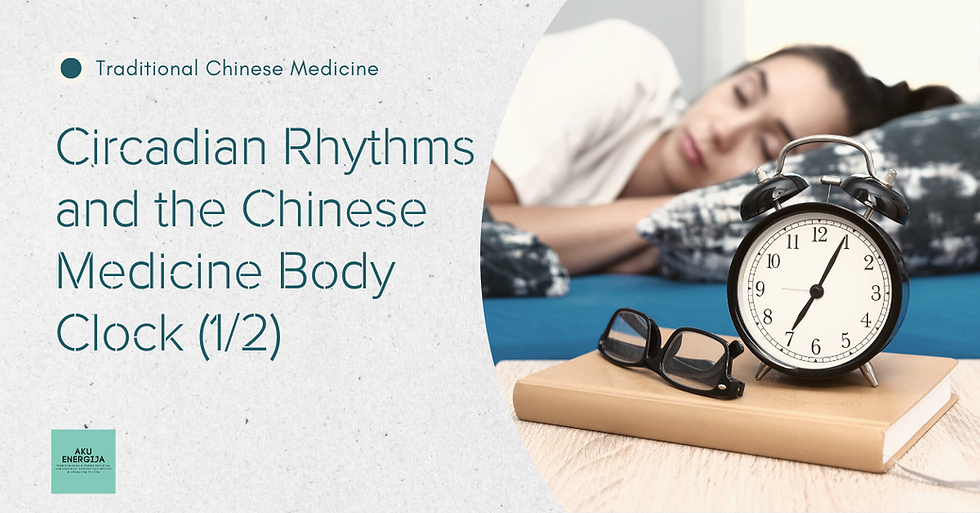TCM Solutions for Restless Leg Syndrome
- Aku Energija
- Aug 30, 2024
- 4 min read
Restless Leg Syndrome (RLS) is a neurological disorder characterized by an irresistible urge to move the legs, often accompanied by uncomfortable sensations. These symptoms typically worsen during the evening or night, disrupting sleep and affecting overall quality of life. While conventional medicine provides various treatments, many individuals turn to alternative therapies like Traditional Chinese Medicine (TCM) for a more holistic approach to relief.

TCM, with its ancient roots and holistic approach, provides a unique perspective on health and disease. This article explores how TCM can help manage RLS symptoms and improve patients' well-being. [Read more: Your Body as a Garden]
Understanding Restless Leg Syndrome
Restless Leg Syndrome is marked by an uncontrollable desire to move the legs, usually due to uncomfortable sensations like itching, pulling, crawling, or throbbing. These symptoms often occur during periods of inactivity, such as when sitting or lying down, and are temporarily relieved by movement. As symptoms are more common in the evening, the urge to constantly move can interfere with your ability to relax or fall asleep. This can cause sleep disruptions, fatigue during the day, mood changes, difficulty concentrating, and even depression or anxiety [1].
The exact cause of RLS is unknown, but it is believed to involve an imbalance in brain chemicals, particularly dopamine, which plays a role in muscle control. Genetic factors, pregnancy, underlying medical conditions (such as kidney failure, iron deficiency, peripheral neuropathy, Parkinson’s disease), and certain medications can increase the risk of developing RLS [1, 2].
TCM Perspective on RLS
In TCM, health is understood as a balance of Qi (vital energy), Yin and Yang (complementary forces), and the proper flow of energy through the body's meridians (pathways). An imbalance or blockage in these systems can lead to various health issues, including RLS.
The TCM diagnostic process involves assessing these imbalances through various techniques, including pulse diagnosis, tongue examination, and patient history.
While RLS is a disease in Western medicine, TCM sees it as a symptom. From the TCM viewpoint, RLS is closely related to Zang-Fu organ imbalances, especially in the liver, heart, and kidneys. The Chinese medical therapy for RLS would primarily involve tonifying the deficiencies and promoting blood circulation. The treatment is tailored for each patient and even for a specific situation or stage [3]. [Read more: TCM vs Western Medicine]
TCM Treatment for RLS
Acupuncture
Acupuncture involves the insertion of fine needles into specific points on the body to balance Qi and stimulate the body's natural healing processes. For RLS, acupuncture can help:
Regulate dopamine levels
Improve circulation
Reduce muscle tension
Calm the nervous system
Herbal Medicine
TCM herbal medicine is tailored to each individual's needs based on their specific symptoms and underlying imbalances. Herbs used for RLS may:
Nourish Blood and promote circulation
Boosts Qi and strengthens the body's resistance.
Calm the liver and alleviate wind, which can reduce involuntary movements.
Massage
Massage is a traditional therapy in which the hands work on the tissues of the body, including tuina, acupressure, and the likes. It is beneficial to the well-being of patients both physically and mentally. It can:
Alleviate the tension in their skin and muscles, thus promoting blood circulation and enhancing the immune system.
Prompt the release of dopamine inside the human body, thus making the patient feel pleased and relaxed. [4]
Dietary and Lifestyle Recommendations
In Traditional Chinese Medicine, dietary and lifestyle changes are essential for maintaining balance and promoting overall well-being. TCM emphasizes the importance of eating on time and with the changing seasons. [Read more: TCM Dietary Advice][Read more: Circadian Rhythms and the Chinese Medicine Body Clock]
The Evidence Behind TCM Treatments for RLS
Numerous case studies and patient testimonials highlight the effectiveness of TCM treatments for RLS. For instance, a randomized controlled trial conducted by Raissi et al. (2017) demonstrated significant improvements in RLS symptoms with acupuncture plus gabapentin compared to gabapentin alone. The study showed that patients experienced better symptom relief and sleep quality, underscoring the therapeutic value of acupuncture in managing RLS symptoms [6].
Another 2023 case report reported significant improvement in RLS symptoms after a course of acupuncture treatments. Patients often describe feeling more relaxed and experiencing fewer symptoms, especially at night [7].
Tips for Relieving RLS
If you're dealing with Restless Leg Syndrome, finding relief can significantly improve your quality of life. Here are some practical lifestyle changes to help manage RLS and improve your comfort:
Adjust Your Bedtime: Going to bed earlier and maintaining a consistent sleep schedule can reduce RLS symptoms. This helps maintain normal cortisol levels and improves sleep quality.[Read more: Circadian Rhythms and the Chinese Medicine Body Clock]
Stretch Before Bedtime: Regular stretching can alleviate the urge to move your legs, a common RLS symptom.
Eliminate Caffeine: Avoid caffeine, as it can trigger RLS symptoms and disrupt sleep.[Read more: 7 steps to cut down on coffee consumption][Read more: Coffee In The View of Chinese Medicine]
Foot bath: A warm bath can relax muscles and reduce RLS symptoms.
Regular Physical Activity: Mild-to-moderate exercise improves overall health and reduces RLS episodes. However, avoid exercising too close to bedtime.
Deep Breathing and Stress Reduction: Stress can worsen RLS. Practice deep breathing, mindfulness, and other stress-reduction techniques. [Read more: Simple mindfulness exercises]
Massage and Yoga: Massage increases dopamine levels, while yoga reduces stress and RLS symptoms.
Avoid Alcohol and Tobacco: Both can exacerbate RLS symptoms.
Traditional Chinese Medicine offers a holistic and individualized approach to managing Restless Leg Syndrome, addressing the root causes of the condition rather than just the symptoms. Whether through acupuncture, herbal medicine, or dietary changes, TCM provides valuable tools for achieving balance and improving quality of life. If you or someone you know is struggling with RLS, exploring TCM treatments may provide much-needed relief and enhance overall well-being.
Reference:
https://my.clevelandclinic.org/health/diseases/9497-restless-legs-syndrome
https://www.mayoclinic.org/diseases-conditions/restless-legs-syndrome/symptoms-causes/syc-20377168
https://www.sciencedirect.com/science/article/abs/pii/S1087079212000056
https://www.emedicinehealth.com/periodic_limb_movement_disorder/article_em.htm







Comments